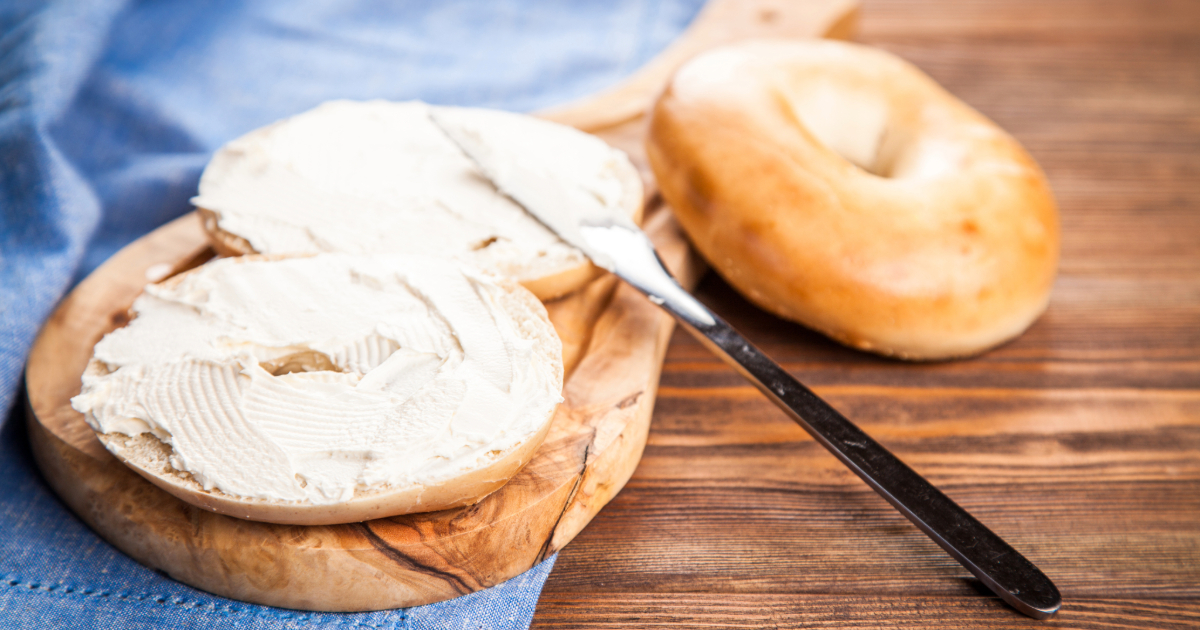Cream cheese and goat cheese are two popular types of cheese, each with their own unique taste, texture, and nutritional profile.

But how exactly do they compare when looking at their overall health impacts and nutritional content?
Understanding the Basics
Cream cheese is a soft, mild-tasting fresh cheese made from cow's milk and cream. It has a smooth, creamy texture and is commonly used as a spread for bagels and crackers or an ingredient in various dips, desserts, and more. Goat cheese, also known as chèvre, is made from goat's milk. It has a tangy, tart flavor and can range in texture from soft and spreadable to crumbly depending on age. Goat cheese is often used in salads, pasta, baked dishes, and more.
When comparing basic nutrition facts, there are some clear differences:
| NUTRIENTS | CREAM CHEESE | GOAT CHEESE |
|---|---|---|
| Calories | 350 cal per 100g | 264 cal per 100g |
| Fat | 34g per 100g | 21g per 100g |
| Saturated Fat | 20g per 100g | 21g per 100g |
| Protein | 6g per 100g | 19g per 100g |
| Carbs | 6g per 100g | 0g per 100g |
As shown, goat cheese is lower in calories and fat but contain more protein than cream cheese. Both are high in saturated fat. Goat cheese also contains no carbs, while cream cheese has a small amount.
Key Takeaway: Goat cheese is lower in calories and fat than cream cheese but higher in protein. Both contain high saturated fat.
Comparing Vitamins and Minerals
When looking deeper at vitamins and minerals, there are some additional nutritional differences between cream cheese and goat cheese:
Vitamin A
Cream cheese contains 308μg of vitamin A per 100g. Goat cheese provides slightly more at 407μg per 100g. So goat cheese is higher in vitamin A.
B Vitamins
Goat cheese contains more riboflavin, niacin, and vitamin B12 than cream cheese. However, cream cheese provides more pantothenic acid and folate. For thiamin and vitamin B6, the amounts are fairly similar between the two.
Calcium
Goat cheese really shines when it comes to calcium content. There is 298mg of calcium in 100g of goat cheese compared to just 97mg per 100g of cream cheese. Goat cheese contains over 200% more calcium, making it an excellent source of this bone-supporting mineral.
Iron
There is also a major difference in iron levels. Goat cheese provides 1.6mg of iron per 100g. Cream cheese only contains 0.11mg per 100g. Goat cheese is far higher in iron.
Sodium
The only mineral cream cheese wins out on is sodium, with 314mg vs 415mg per 100g in goat cheese. So cream cheese contains less sodium than goat cheese.
Key Takeaway: Goat cheese is higher in vitamin A, calcium, iron and most B vitamins. Cream cheese contains more sodium but provides more pantothenic acid and folate.
| NUTRIENT | CREAM CHEESE | GOAT CHEESE |
|---|---|---|
| Vitamin A | 308 μg | 407 μg |
| Riboflavin | 0.23 mg | 0.676 mg |
| Niacin | 0.091 mg | 1.148 mg |
| Pantothenic Acid | 0.517 mg | 0.19 mg |
| Folate | 9 μg | 2 μg |
| Calcium | 97 mg | 298 mg |
| Iron | 0.11 mg | 1.6 mg |
| Sodium | 314 mg | 415 mg |
Health Impacts
When evaluating the potential health impacts of cream cheese and goat cheese, there are pros and cons to consider for each.
Heart Health
The high saturated fat content of both cheeses may negatively impact heart health if consumed in excess. However, some research suggests goat cheese may have less impact on cholesterol levels compared to cow-milk cheeses high in saturated fat like cream cheese. Still, moderation is key.
Bone Health
Goat cheese supports bone health far more than cream cheese. With over 200% more calcium and significantly more protein, goat cheese provides major benefits for bone density and strength.
Digestion
Goat cheese is typically easier to digest than cream cheese, especially for those sensitive to cow's milk. Many people prone to dairy issues like bloating can still tolerate goat's milk products. The higher protein and lower carbs in goat cheese also promote stable blood sugar.
Weight Management
Goat cheese may promote greater weight loss and management. With 64 fewer calories and less total fat per serving, goat cheese is generally the lighter option. The higher protein also boosts satiety.
Overall, goat cheese has more nutritional benefits over cream cheese, thanks largely to its higher amounts of protein, calcium, and other vitamins and minerals. However, cream cheese can still be enjoyed in moderation by those without sensitivities or weight concerns.
Key Takeaway: The high saturated fat in both cheeses may negatively impact heart health. However, goat cheese has more benefits for bone health, digestion, and weight management.
| NUTRIENTS | BENEFITS | WINNER |
|---|---|---|
| Protein | Growth/repair, satiety | Goat cheese |
| Calcium | Bone strength | Goat cheese |
| Iron | Oxygen transport | Goat cheese |
| Sodium | Nerve signaling | Cream cheese |
| Saturated Fat | Heart disease risk | Potentially goat cheese |
How Do They Taste Different?
When it comes to flavor and texture, cream cheese and goat cheese offer very different eating experiences:
Cream cheese has a rich, creamy, and slightly tangy taste. The texture is smooth, thick, and spreadable. It tends to coat the mouth and has a mildly sweet finish.
Goat cheese offers a more pronounced tangy and tart flavor. It tastes brighter and more complex. The texture ranges from smooth and creamy when fresh to crumbly and dry when aged. It tends to feel lighter in the mouth compared to richer cream cheese.
Cream cheese works well as:
- A bagel spread
- A base for dips
- An addition to frosting or icing
- A star ingredient in classic cheesecake
Goat cheese shines when:
- Crumbled over salads
- Added to an omelet or pasta
- Paired with fruits like figs or pears
- Baked into tarts
So those with a sweet tooth may favor cream cheese, while those wanting a more dynamic flavor may prefer goat cheese. Both offer unique culinary possibilities.
Price Differences
There is often a significant price difference when comparing store-bought cream cheese and goat cheese:
| PRODUCT | AVERAGE COST |
|---|---|
| Cream Cheese (8 oz) | $2 to $3 |
| Goat Cheese (4 oz) | $4 to $8 |
Goat cheese tends to cost nearly double or more per ounce than cream cheese. This is because producing goat's milk cheese requires more effort compared to mass-produced cream cheese. The lower yields and more extensive process increase the market price.
However, there are budget-friendly options for both types of cheese in most markets. And for those focused on health, the extra cost of goat cheese is often worth it for the added nutrition. Prioritizing quality over quantity is key when incorporating either into your diet.
Potential Allergies
Some important notes on potential dairy allergy issues:
Lactose Intolerance: Goat cheese is lower in lactose than cream cheese, so it may be better tolerated by some. But both still contain milk sugars.
Cow Milk Allergy: Those with an allergy may potentially consume fermented goat cheese but should avoid all cream cheese.
Goat Milk Allergy: People with goat milk allergies need to avoid all goat cheese products. Cream cheese would be the safer choice.
In any case, consult a doctor if you suspect a food allergy or intolerance to dairy. Stopping consumption if adverse reactions occur is also crucial.
FAQs
Is goat cheese healthier than cream cheese?
Yes, goat cheese is healthier overall, being lower in calories and fat yet higher in protein, calcium and other key nutrients. The nutrition differences lead to advantages for bone, heart, and digestive health.
Can you use cream cheese instead of goat cheese?
You can substitute cream cheese for goat cheese in some recipes, but the flavor will be quite different. Cream cheese lacks the characteristic tanginess of goat cheese. Adjusting other ingredients like herbs can help compensate.
Is goat cheese better for skin than cream cheese?
Yes, goat cheese has more benefits for skin health compared to cream cheese. The vitamin A promotes skin cell turnover for a glowing complexion, and the lower fat content may help prevent clogged pores and acne.
What has less lactose, goat cheese or cream cheese?
Goat cheese contains less lactose than comparable amounts of cream cheese. So those lactose intolerant may potentially tolerate small amounts of hard goat cheese but should still avoid all soft cream cheese.
Conclusion
Goat cheese wins overall for nutrition. But cream cheese can still be enjoyed occasionally, especially by those without sensitivities.
Choosing grass-fed goat varieties provides even more nutritional upside.

